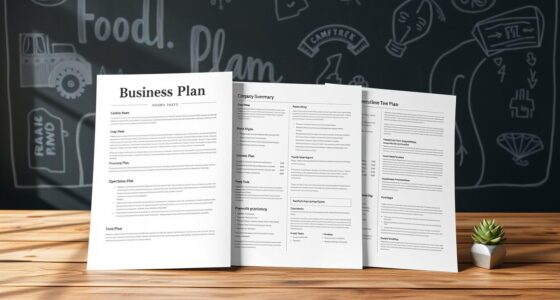Building strong relationships with suppliers and partners is key to ensuring trust, collaboration, and long-term success. Engage in regular communication, listen actively to their concerns, and show reliability and transparency. Celebrating shared achievements and addressing conflicts openly helps foster goodwill. Prioritizing mutual benefits and clear negotiations create a foundation for innovation and stability. If you keep exploring, you’ll uncover even more effective strategies to strengthen these essential connections.
Key Takeaways
- Maintain consistent, open communication to build trust and keep partners informed of needs and progress.
- Practice active listening to understand concerns and suggestions, fostering goodwill and collaboration.
- Demonstrate reliability and transparency to strengthen trustworthiness and long-term commitment.
- Show appreciation and celebrate shared successes to nurture positive rapport and loyalty.
- Address conflicts promptly and constructively to sustain healthy, mutually beneficial relationships.

Establishing strong relationships with suppliers and partners is essential for the success of your business. When you foster these connections, you create a foundation of trust and collaboration that can lead to better outcomes for everyone involved. One of the most critical aspects of building these relationships is effective contract negotiation. You need to approach negotiations with a clear understanding of your needs and priorities, while also considering the supplier’s or partner’s perspective. Skillful contract negotiation ensures that terms are fair, benefits are maximized, and potential conflicts are minimized. It’s not just about getting the best deal; it’s about establishing an agreement that supports a long-term partnership. When negotiations are handled well, they lay the groundwork for ongoing cooperation and mutual success.
Effective contract negotiation builds trust, maximizes benefits, and supports long-term partnerships for mutual success.
Beyond individual contracts, exploring joint ventures can profoundly deepen your relationships with key partners. A joint venture allows you to combine resources, expertise, and market access with another company, creating a strategic alliance that benefits both parties. Forming a joint venture requires open communication, mutual trust, and shared goals. By working closely with your partners on joint projects, you can leverage each other’s strengths, reduce risks, and accelerate growth. These collaborations often lead to innovative solutions and new opportunities that wouldn’t be possible alone. Developing a joint venture also signals your commitment to a long-term relationship, which can strengthen trust and loyalty. Additionally, understanding market trends and market dynamics can help you identify the best opportunities for collaboration and growth.
To build these strong relationships, you should prioritize regular communication. Keep your partners updated about your business needs, challenges, and successes. Listening actively to their concerns and suggestions shows respect and fosters goodwill. Demonstrating reliability and transparency helps solidify your reputation as a trustworthy partner. Additionally, showing appreciation for their contributions and celebrating shared achievements nurtures a positive working environment. When conflicts arise, address them promptly and constructively, focusing on solutions rather than blame. This approach helps maintain a healthy relationship even during difficult times.
Ultimately, your goal is to develop partnerships built on mutual benefit, respect, and shared vision. Whether it’s through skilled contract negotiations or strategic joint ventures, your efforts to cultivate strong relationships will pay dividends over time. They can lead to more favorable terms, increased stability, and collaborative innovations that keep your business competitive. By investing in these relationships now, you set the stage for sustained success and growth in the future.
Frequently Asked Questions
How Do I Evaluate the Reliability of a New Supplier?
You evaluate a new supplier’s reliability by conducting thorough supplier audits to assess their processes and compliance. Review their performance metrics like delivery times, quality standards, and responsiveness. Communicate directly with their references and request samples or trial orders. Consistent performance during audits and positive performance metrics signify a dependable supplier. Keep monitoring their performance regularly to guarantee ongoing reliability and address any issues promptly.
What Are Effective Strategies for Resolving Supplier Disagreements?
When disagreements arise, view them as opportunities for growth rather than conflicts. You should employ effective conflict resolution and negotiation tactics, like active listening and finding common ground, to address issues calmly. Stay respectful and open-minded, ensuring both parties feel heard. Clear communication helps prevent misunderstandings and builds trust. By approaching disagreements with patience and professionalism, you foster stronger supplier relationships and turn challenges into collaborative solutions.
How Can I Nurture Long-Term Partnerships With Key Suppliers?
You can nurture long-term partnerships with key suppliers by focusing on trust building through consistent, transparent communication. Make an effort to understand their needs and share your expectations clearly. Regular check-ins and prompt responses help strengthen the relationship. By demonstrating reliability and openness, you foster loyalty and collaboration, ensuring both parties feel valued and committed, which ultimately leads to a sustainable, mutually beneficial partnership.
What Legal Considerations Should I Keep in Mind in Supplier Agreements?
You should review contract clauses carefully to guarantee clear terms on pricing, delivery, and dispute resolution. Protect your intellectual property by including confidentiality and licensing clauses. Keep legal considerations in mind by understanding applicable laws and regulations, such as compliance requirements and liability limits. Always consult legal experts to draft or review agreements, helping you mitigate risks and establish a solid foundation for your long-term supplier relationships.
How Do Cultural Differences Impact International Supplier Relationships?
Imagine a misstep that could jeopardize your international partnership. Cultural differences deeply impact relationships—you must practice cultural sensitivity and recognize communication barriers. These can cause misunderstandings or mistrust if overlooked. By actively learning about your supplier’s customs, traditions, and communication styles, you foster respect and clarity. Staying adaptable and open-minded keeps your collaboration strong, turning potential obstacles into opportunities for growth and mutual success.
Conclusion
Building strong relationships with suppliers and partners is like tending a garden—you nurture trust, water communication, and watch your network flourish. When you invest time and honesty, you create a web of support that catches you in times of need. Remember, these connections are the roots that strengthen your business. Cultivate them with care, and you’ll find your success blooming brighter than ever, turning every partnership into a fruitful harvest.









